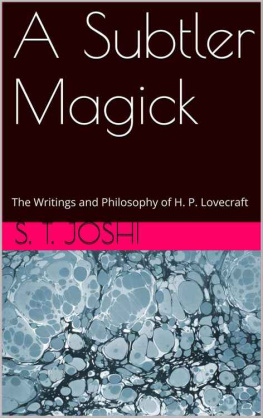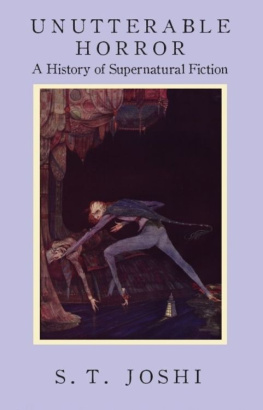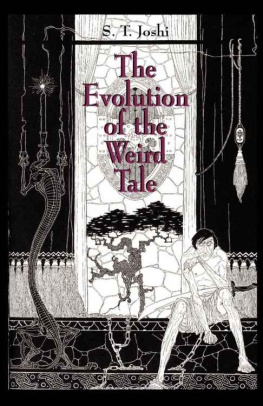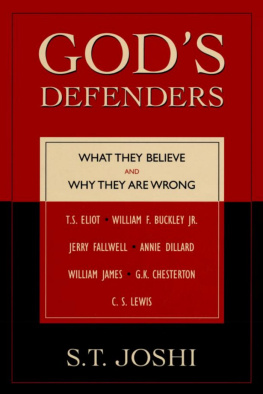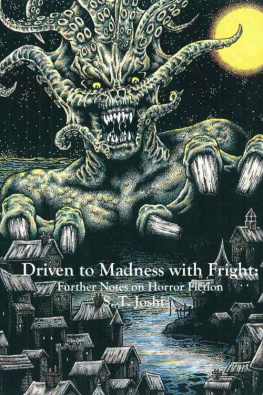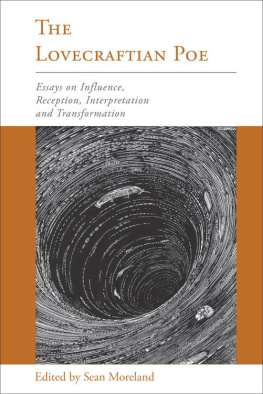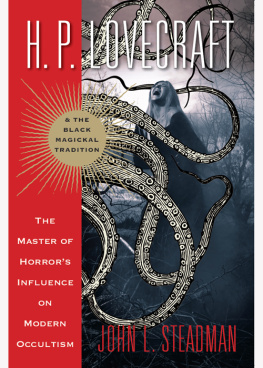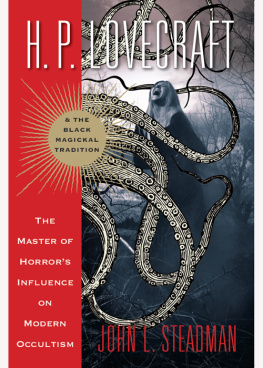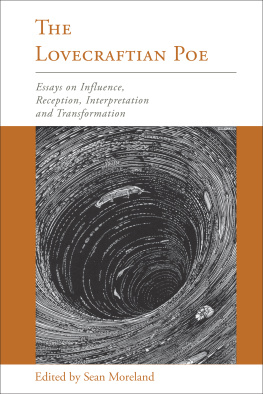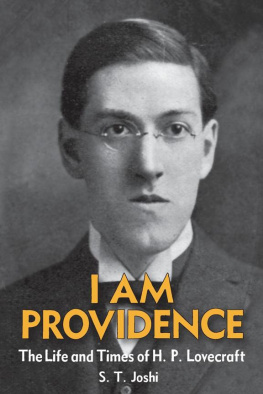ASubtler Magick:
The Writingsand Philosophy of H. P. Lovecraft
S. T. Joshi
HippocampusPress
New York
Copyright 1982,1996, 2016 by S. T. Joshi. All rights reserved.
Originallypublished (as H.P. Lovecraft )by Borgo Press, 1982 (rev. ed., 1996).
Published byHippocampus Press
P.O. Box 641, NewYork, NY 10156.
http://www.hippocampuspress.com
All rights reserved.
No part of this workmay be reproduced in any form or by any means without the writtenpermission of the publisher.
Hippocampus Presslogo designed by Anastasia Damianakos.
First electronicedition, 2016
ISBN978-1-61498-159-6
Contents
Dedication
ToTHE MEMORY OF
FRANKBELKNAP LONG, JR.
Introduction
WhenI wrote the first version of this book, H. P. Lovecraft, in the summer of 1981, Lovecraft research was in the midst of arenaissance: with the emergence of such scholars as Dirk W. Mosig,Donald R. Burleson, and others who were consolidating the earlierresearches of Fritz Leiber, George T. Wetzel, and Matthew H.Onderdonk, the study of Lovecraft seemed to be progressing by leapsand bounds. The purpose of my anthology, H. P. Lovecraft:Four Decades of Criticism (1980), was reallynothing more than to codify the best of this earlier work; but itsappearance seems to have triggered new work as well. Just as thefirst edition of this book was published in 1982, such diversescholars as Steven J. Mariconda, WillMurray, and Robert M. Price were revolutionising the field in variousways; Burleson, Peter Cannon, Barton L. St. Armand, David E. Schultz,and others were continuing to add their own substantialcontributions; and the emergence of my corrected editions ofLovecrafts texts from Arkham House allowed still more preciseand detailed scholarship to emerge.
All this work was brought to aculmination by the H. P. Lovecraft Centennial Conference in August1990. The published proceedings of that conference, as well as theanthology of original essays issued at about the same time ( AnEpicure in the Terrible, editedby David E. Schultz and myself), may well represent a sort ofpinnacle in the criticism and recognition of Lovecraft. It iscertainly not the case that Lovecraft studies will, or should, everreach a stage of completion, and one of course hopes that his life,work, and thought will constantly be subjected to reinterpretation;but we have now reached the stage where many of the basic factsneeded for a sound analysis of Lovecraft are available, and it is nowthe responsibility of scholars to make use of these facts in order toproduce ever more subtle and profound studies of the man and hiswork.
I have certainly benefited from thework of all my colleagues in the field, and I welcome the chance towrite a book such as this. I am myself surprised at the degree towhich my views on Lovecraft have changed over the past decade, and Itrust that readers will find this book to be virtually a new workrather than merely a patched-up version of the original. Indeed,aside from the initial chapter and a few small portions of others,this version has been written entirely afresh, without evenconsultation of the original. The generous amount of space allowed bymy publisher for this edition has also freed my hand consider ablyto discuss points in the depth and detail they require. Accordingly,I have not only expanded but entirely restructured this book, and Ihope that it now paints a more accurate picture of the development ofLovecrafts work over his career.
As I write this book I am also inthe midst of writing a full-length biography of Lovecraft. I havenaturally drawn from that work-in-progress, but the quite differentfocus of this book should make it stand independently of the other.But work on the biography makes me still more convinced of theessential unity and integrity of Lovecrafts life and work, andI hope that I have conveyed that unity and integrityhere.
The debt I owe to my colleaguesshould be obvious, and I should also like to thank Marc A. Michaud,James Turner, and other of my friends and associates for theirsupport of my work over the last two decades. Steven J. Mariconda has read adraft of this book and has as always supplied illuminating comments.
The following abbreviations areused in the text and notes:
D Dagon and Other Macabre Tales (Arkham House, 1986)
DH The Dunwich Horror and Others (Arkham House, 1984)
FP The Fantastic Poetry (Necronomicon Press, rev. ed. 1993)
HM The Horror in the Museum andOther Revisions (ArkhamHouse, 1989)
MM At the Mountains of Madnessand Other Novels (ArkhamHouse, 1985)
MW Miscellaneous Writings (Arkham House, 1995)
JHL H. P. Lovecraft Papers, JohnHay Library, Brown University (Providence, RI)
SL Selected Letters (Arkham House, 196576; 5 vols.)
S.T. Joshi
NewYork City
An H. P. Lovecraft Chronology
1890 (20 August) Howard Phillips Lovecraft is born at 454 Angell St.in Providence, R.I., son of Winfield Scott Lovecraft and Sarah SusanPhillips.
1890 (through 1893) Lovecraft and his parents reside at variouslocales in Massachusetts (Dorchester, 189092; Dudley, summer1892; Auburndale, 189293?) as father, Winfield ScottLovecraft, pursues business interests.
1893 April 25: Hospitalization of Lovecrafts father at ButlerHospital in Providence; Lovecraft and his mother, Sarah SusanLovecraft, return to family home at 454 Angell St.
1897 First writings in fiction (The Noble Eavesdropper)and poetry (The Poem of Ulysses).
1898 Discovers Edgar Allan Poe. Voluminous writing of stories (TheSecret Cave, The Mystery of the Grave-Yard,John the Detective), some inspired by dime novels.Begins study of chemistry.
July: Death of Lovecrafts father. Lovecraft and mother spendsummer in Westminster, Mass. (through 1899, and 190203)Attendance at Slater Avenue School.
1899 4 March: Begins handwritten journal, The Scientific Gazette(sporadically to 1909), largely devoted to chemistry.
1902 Winter: Discovers astronomy, largely from books in library ofmaternal grandmother. Writes tales inspired by Jules Verne(non-extant).
1903 2 August: Begins The Rhode IslandJournal of Astronomy (sporadically to 1909). Much scientific work in chemistry,astronomy, geography, history, mythology.
1904 28 March: Death of Lovecrafts maternal grandfather,Whipple Van Buren Phillips; familys subsequent financialcollapse causes move to 598 Angell St in Providence.
1904 (through 1908) Intermittent attendance at Hope Street HighSchool.
1905 The Beast in the Cave.
1906 (through 1908) Writes astronomy columns for Pawtuxet Valley Gleaner and Providence Tribune.
1908 Nervous breakdown causes Lovecraft to withdraw from high school.The Alchemist.
1909 (through 1912) Takes correspondence course in chemistry; writesA Brief Course in Inorganic Chemistry (1910; non-extant).
1913 September: Literary controversy with John Russell in the lettercolumns of Argosy leads to Lovecrafts entry intoamateur journalism (6 April 1914).
1914 (through 1923) Voluminous writing of essays, poetry, editorials,and reviews in the amateur press, mostly for the United Amateur PressAssociation (UAPA), but also later for the National Amateur PressAssociation (NAPA), which Lovecraft joins in 1917. Early amateurcolleagues: Maurice W. Moe; Rheinhart Kleiner; W. Paul Cook; SamuelLoveman.
(through 1918) Writes astronomy column in Providence Evening News.
1915 April: First issue of Lovecrafts amateur journal, TheConservative (to July 1923; 13 issues in all).
1917 May: Attempts enlistment in Rhode Island National Guard andlater in the U.S. Army; through his mothers influence, he isrejected. June: The Tomb, first fictional work after anine-year hiatus.
Next page
